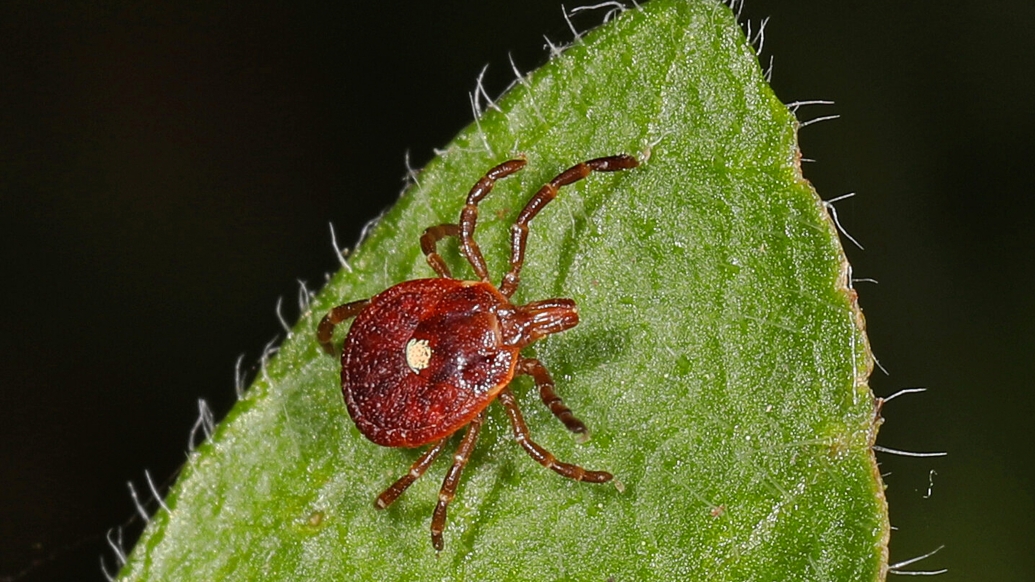The approach could offer those with food allergies another option besides avoidance
11:08 AM
Author |

Nanoparticles delivered intravenously in mice can block the allergic reactions to red meat caused by the bite of the lone star tick, research led by the University of Michigan shows.
The condition, called alpha-gal syndrome, is on the rise in humans as climate change and other factors have led the ticks to expand their habitat.
Developed at U-M, the nanoparticles contain allergens that retrain the immune system to ignore the type of sugar found in beef, pork, lamb and other mammals.
Once the nanoparticles were delivered to test subjects, University of Virginia research collaborators exposed those mice to ticks to trigger an immune response to alpha-gal sugars.
In 10 out of 12 mice, a reduced immune response was recorded.
A paper on the findings is published in Frontiers in Allergy.
Other nanoparticles developed at U-M have shown similar effectiveness in dealing with more common egg and peanut allergies.
Research published in May showed two doses of allergen-encapsulating nanoparticles delivered intravenously prevented anaphylaxis during allergy tests in mice.
Food allergies often leave those affected with few options other than avoiding whatever products cause the reactions.
“Treating food allergies usually means desensitizing patients to the allergen so that their immune system does not react inappropriately,” said Lonnie Shea, the Steven A. Goldstein Collegiate Professor of Biomedical Engineering at U-M and co-corresponding author on the study.
“Our nanoparticles, when introduced prior to or after sensitization, have been remarkably effective in reducing the immune response in multiple food allergies.
“There is the potential here for a platform technology that can be used to address a variety of food-allergic responses.”
Alpha-gal syndrome is thought to be transmitted to humans via lone star tick saliva when the insect bites.
It can cause hives and itching, scaly skin, swelling of the face, throat or other body parts, shortness of breath, stomach pain, diarrhea and vomiting.
In some cases, the allergic reaction it causes can be fatal.
In 2023, the Centers for Disease Control and Prevention estimated 450,000 United States residents may be living with alpha-gal syndrome—admitting that number is likely far lower than the actual figure.
Historically based in the southeastern United States, lone star ticks have been increasingly found in the Midwest and Northeast, as well as in Canada.
“Typically, when a body detects an allergen, immune cells mistakenly identify it as a harmful substance and release antibodies that attack it,” said Loren Erickson, associate professor of microbiology, immunology and cancer biology at the UVA School of Medicine. “
We found that treatment with several doses of nanoparticles reduced certain allergic reactions that were linked to changes in the immune response to alpha-gal.
“While these findings highlight the first therapeutic potential of nanoparticles to treat red meat allergy, we’re calling for further studies to better understand the implications and the long-lasting effects of nanoparticle treatment.”
In addition to the research in mice, this allergen-encapsulating nanoparticle platform has completed a phase two clinical trial for treating the autoimmune condition celiac disease.
“Traditional allergen-specific immunotherapies, such as oral or skin-based immunotherapy, expose the patient to allergen daily,” said Jessica O’Konek, research assistant professor at U-M’s Mary H. Weiser Food Allergy Center and co-corresponding author on the study.
Over time, this desensitizes the patients to the allergen, meaning the immune system largely ignores the allergen, she says.
However, these immunotherapy protocols are often months to years in duration, and patients often have their allergies return if they stop the therapy.
“Our goal with the allergen-encapsulating nanoparticles is to retrain the immune system to be tolerant to the allergen with a small number of doses, with the ultimate goal of achieving long-lived tolerance,” O’Konek said.
Funding/disclosures: The research was supported by the National Institutes of Health. Shea is a consultant and has financial interests in Cour Pharmaceutical, which is pursuing a license to this technology.
The original story was published by U-M biomedical engineering.

Explore a variety of health care news & stories by visiting the Health Lab home page for more articles.

Department of Communication at Michigan Medicine
Want top health & research news weekly? Sign up for Health Lab’s newsletters today!




